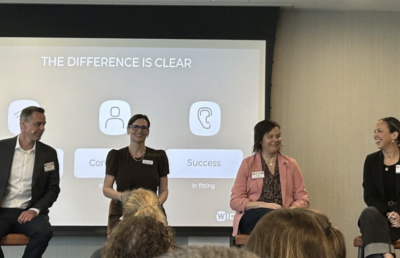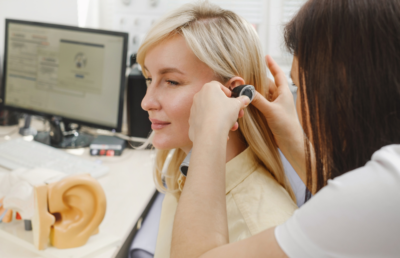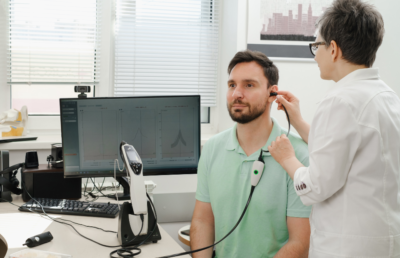Hearing loss is a common concern in the United States, impacting 15% of American adults over the age of 18, or roughly 40 million people.
But despite its prevalence, it can be a difficult subject to approach when you begin to notice hearing loss in a loved one. To support your loved one and encourage them to see an audiologist, consider the following.
How to Tell Your Loved One They Should See an Audiologist
Approach the Subject Gently
Hearing loss can be a touchy subject. But, the odds are, if you’ve noticed a change in your loved one’s hearing, they have too. They may be worried, afraid, or in denial. They may believe that if no one says anything to them maybe it isn’t really a concern.
Consider these concerns and be gentle when broaching the subject. Ask them about their hearing and whether they have noticed a change recently. Offer to support them by booking an appointment with an audiologist on their behalf.
Keep in mind that if someone is unaware of their hearing loss, embarrassed, or in denial, they may be resistant to the conversation and the idea of seeing a hearing health professional. Be sensitive to their feelings and make sure you are talking to them and not at them.
Be Positive
Hearing loss, while complicated, is not something to be feared.
While it may require adjustments, accommodations, and hearing-assisted devices, hearing loss does not have to interfere with the day-to-day enjoyment of life. By not giving in to a doom and gloom attitude, you can help reduce the societal stigma that sometimes accompanies hearing loss, and create a safer, more supportive environment for your loved one.
Do Some Research
To properly discuss hearing loss with your loved one, you must first understand it. While there are many types and causes of hearing loss, a general understanding will go a long way.
You do not necessarily need to know the exact functions of the inner ear or the mechanisms involved in hearing-assisted devices, but bringing a little bit of knowledge to the conversation can help engage the other party.
Not only will you have some facts and background that may support your recommendation to see an audiologist, but it will amplify your compassion. When you understand the potential emotional impact of hearing loss, you will be better equipped to respond to any pushback you receive.
Do research to find a reputable audiologist who will take time with your loved one. This step is vital to the successful adoption of hearing aids and the longtime benefit of amplification. Google reviews are a great place to start.
Furthermore, knowledge of effective interventions and their positive effects can help you demonstrate that you are coming from a place of care.
Suggest Getting a Hearing Test Together
Things are often easier when there is someone there to do it with you.
We suggest telling your loved one that you are about to book a hearing test and asking them if they’d like to have one, too.
This can be a great way to encourage someone who is not very enthusiastic about the idea. If they push back against the idea, simply explain that everyone should have their hearing tested at least once every 3 years, especially after the age of 65.
If they continue to resist, it is better to leave it alone and ask again at another time.
Explain Why It Matters and the Benefits of Treatment
The unfortunate reality is that when left untreated, hearing loss can have a range of negative impacts.
Untreated hearing loss can get worse over time. When under the care of an audiologist, strategies, support, and hearing assistive devices can be deployed to ease the burden and minimize impacts.
Untreated hearing loss increases listening effort and can cause strain on the whole body. By reducing the cognitive load and listening effort, your loved one will be able to hear conversations more and participate more fully.
Studies have found a connection between hearing loss and cognitive decline. One study of older adults with untreated hearing loss suggested that a hearing intervention may reduce cognitive changes for those at a greater risk of cognitive decline.
A 12-year study of 639 adults found that mild hearing loss doubles the risk of dementia, moderate hearing loss triples the risk, and profound hearing loss increases the risk by five times.
Untreated hearing loss may also increase fall risks. When walking, our ears pick up subtle cues that support balance. If your brain has to work much harder to hear these cues, it cannot devote the proper subconscious resources to balance and proper movement.
All of these things matter. It is not necessary to frighten your loved one into seeking help, but they must understand the risks and that an audiologist can mitigate some of these circumstances.
Ask an Audiologist for Advice
If you are unsure of how to tell your loved one that they need to see an audiologist, you can ask one for advice.
At Chicago Hearing Services, our team of audiologists has the expertise and compassion required to support individuals and their loved ones in navigating hearing loss.
We understand that the hearing loss journey is different for everyone and we tailor our interventions and strategies to meet the unique needs of each person that comes through the door.
To support your loved one in finding the right help, reach out to us today!





